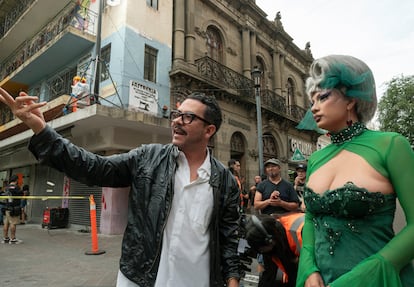Mexican director Manolo Caro (Guadalajara, 40 years old) returns to the small screen with a hilarious series and loaded with poison, such as the ponzoña of some snakes. Humor is the genre to which the filmmaker resorts again to make a deep criticism of a society submitted by corrupt politicians, in which people are forced to change their principles for others that adapt to the system and where the values of ethics and morals are destroyed by ambitions. Snakes and stairsthat Caro has released this week in Netflix, is the great laugh that the director of the successful THE HOUSE OF FLOWERS Against Mexico of corruption, violence and classism. “Humor is the genre in which I feel more comfortable, in which I also have the possibility of talking about very deep issues from a critical, dark, funny place,” explains Caro.
The series takes place in Jalisco, considered one of the most conservative states in Mexico and where the director was born. It tells Dora’s story, a prefect of a school where the children of the Jalisco high society attend. Dora (brilliantly interpreted by actress Cecilia Suárez) is very high the values of ethics and morals governs her life, although she is secretly an ambition that is her own cross: that of becoming director of the school. Every day he wakes up with a shocking charge of positivism, entrusts his day to a calendar with the portrait of the Italian singer Laura Pausini as a Catholic to the Virgin of Guadalupe and points the same phrase in a notebook: “I deserve to be a director.” A song by Juan Gabriel – spiritual and musical guide from an entire country – accompanies her in her old car to work: “I will continue trying to be better,” he sings. Both self -help manual positivism is soon broken by a series of events that lead to Prefecta, which changes its principles for others, not necessarily supportive.
A lawsuit between a boy and a girl (she throws the cone of an ice cream on her face and also accuses her of crushing a testicle in the brawl) unleashes the demons of the conservative society. Due to this childhood incident, two parents take their old grudges. She, Tamara Sahagún (played by Marimar Vega), is married to the consul of Spain in Guadalajara (the Spanish actor Martiño Rivas), and he, Olmo Muriel (Juan Pablo Medina), is a powerful businessman of the chocolate of doubtful scruples. In the past they were a couple, but he left her almost planted on the altar for having had a relationship with another woman, who was pregnant with an “error.” Sahagún does not forgive the displacement and makes his handsome husband use his influences to try to crush the chocolate. She herself, daughter of the high spheres, feels as Spanish as the gazpacho, mimics the recreational accent and despises her Mexican peers. Everything in the series is a laugh to the prejudices of a society that, as an old Mexican politician would say, is “aspirationist.”
The series enters an entanglement of political power that involves the governor of the state, he himself anxious to get the Spanish passport, the mafias that harass Dora’s son for getting involved in clandestine bets, the sexist violence of the expos of the prefect, the contempt for women (“I do not like using misogyny against my enemies,” says the chocolate manufacturer) In the opulent parties, the classism of a rich society that despises the poor (“the ugly ones did not ask to be born and they continue, wanting her”), the prejudices about how foreigners see Mexico (“how is that going to be your friend, if she is a native”, he snapks the consul to his son) and his eye on Europe as the maximum aspiration (“he took out the lottery marrying a Spanish. Bright winks that make the series a refreshing criticism and a mockery of a world that seems delivered to the banal, but that is also a call for attention to the rise of extremisms and an attempt to annihilate causes and rights that we gave for sitting.
Ask. In the series he resorts to humor to address issues of a corrupt, class, racist and violence society. Is your work a form of complaint about these problems that Mexico suffers?
Answer. Clear. I believe that the work we do, apart from entertainment, goes hand in hand with a responsibility to talk about the issues that concern us and that move us and that bother me. I have always used comedy to put your finger on these things and that everyone questions how we are standing in front of them, who we are and the behavior we have as a society. Sometimes we believe that power, beauty or wealth are like adjectives that we use to pass over everything. That moves me a lot and I’m interested in talking about it.
P. Why did you decide to return to work in such a Mexican series?
R. Because I wanted to return to my country, to make comedy. They had been eight years of not making comedy. It is the genre in which I feel more comfortable, in which I also have the possibility of talking about very deep issues from a hilarious, critical, dark, funny place. And to make comedy, I think the main thing is to start laughing at oneself. And that is a great exercise that I do towards my person and from which I feel very proud.
P. The series begins with a message about ethics and morals, about what is correct or wrong in people’s behaviors. His characters revolve again and again in the transgression of those values. Is it a attention call?
R. Of course, I believe that ethics and morals have put themselves in such a thin line and is so different for each person. That is, I think he talks about values, he talks about principles, but it will not be the same value of ethics and morals that has the person who is reading this note, that he who has me. That has always seemed very questionable, because what is ethical and what is moral for whom? How do we use it? And why do we sometimes use it to climb, as in this game of Snakes and stairs? That is, it is very interesting how ethics and morals have been modified over the years by people.

P. How difficult is it to address these issues without falling into stereotypes?
R. Well, it’s always difficult because you realize that you are part of the problem and when you think you are above it is when the error is made. What I speak in Snakes and stairs It is of situations in which I have seen myself immersed and in which I have come badly, and that is the interesting thing. That is, I believe that corruption in a country like Mexico seems to be in our DNA, so changing it, seeing it and pointing it to you is an exercise of deep honesty and that is what happens to me with the series. I do not do this series to say “you are corrupt”, but to say I have also been in this situation of corruption, we have all been at some level.
P. A character says: “The ugly ones did not ask to be born and there they continue, letting him.” Are we facing a mirror whose reflection can’t like it?
R. We are facing a society that we are questioned every day of how much acceptance we have on social networks, how many likeshow many applause, how many praise, that we are obsessed because we are told beautiful things of who we are, of the quality of life we have, and we are creating a society that everything is out and that it seems that it is ridiculous to think that everything that is put on or everything we exhibit of us has a burden of beauty, success, triumph, of wealth; that is overwhelming and that has created a generation full of doubts, fears, horror not belonging. I think what these characters do when saying such tremendous phrases is fair to laugh, that is, take it to the extreme so that the public can understand that we are going to that site.
P. There are many winks today, such as when the character of the conservative consul speaks that some “weak” would call him ultra -right. And a mother says, outraged: “We don’t seek to be more modern.” Do you worry about the rise of extreme political groups in public life?
R. Of course, the question seems right. Not that I worry, it’s that he’s in my head every day. I go crazy to think that we are going back and that all the steps we have taken and that all the struggles and flags that we have defended, seem that today is to cancel them, minimize them, invisible them, when part of my work has been quite the opposite, make visible to minorities and which I belong to. It gives me terror that in the United States there is a government like the current one, it gives me terror that there is ultra -right in Europe. Obviously, it gives me terror that also wins the conservatism in Mexico, because I think of my nephews, I think of the new generations and I would not like to go through all those battles that we had already won.
P. Can laughter against politicians and politics be a form of rebellion against abuses?
R. Yes. That is, I do not know whether to call it rebellion, but I call it a way of putting a red focus, an alert, as you say, and make visible what is happening to us and what we sometimes think is a simple laugh, one thing that will happen and that is not happening, that is being restored in society. I am terrified by politicians who do not help the transition, who do not help create bridges, who want to remain because power is very sexy, but the power in the end corrupts. And if you do not know at what time to get out of there, the only thing you are going to become is a worst person, because there is no person who can get out of power to full hands, of unlimited power, of power without being questioned.

